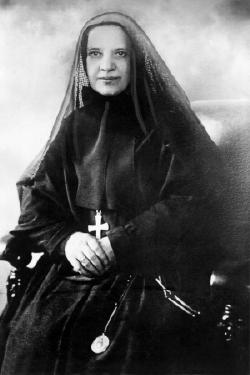 |
| Mother Frances Xavier
Cabrini -- CNS |
By MARGARET CESSNA
It was the head that really got to me. It was wax. I had approached the sanctuary after Mass at the Shrine of Mother Cabrini in Manhattan to view her glass-encased body. Her body was there, the sign said, but her head was reconstructed of wax.
“Who decided that?” I wondered. “Why would God preserve her and not other holy people? Surely a personal God, a God who is involved in every life, would not play favorites. And what was that about her head?”
There was no one to ask, so after I got home, I called the shrine to find out about it. I called on a weekday during business hours. This was their business, after all. An elderly-sounding woman answered the phone. I told her about my questions. “Oh, honey,” she said, “it is just one of those crazy things that the church does.” She told me that Mother Cabrini’s head and hands were in her hometown in Italy and the rest of her was at the shrine in New York. “We have most of the bones,” she said, “and her hometown has the rest. They wanted to have something and that is what they got.”
When I asked if the shrine had only bones or if the body had been preserved, she said, “I think there is a little bit of skin. They open the glass every six years, you know, to make sure that she is OK.”
The 15-minute experience in the shrine catapulted me on a long and lonesome journey of wondering about a personal God. And about Mother Cabrini’s head.
When I was young, I was taught that this personal God hears every prayer, gives everyone the same chances and rewards, and punishes all according to the same guidelines. My faith was one of comfort and fervor. But as I grew up, I began to question what seemed to be too-simple answers about faith, prayer and God.
What is there to think and believe about a God who would sort of preserve a saint and not preserve everyone, so that all who loved them could continue to revere their sort-of-preserved remains? Maybe I shouldn’t be placing this responsibility on any god at all. There is, however, a residue from my earlier days of reading the lives of the saints. And what I had learned is that only God can preserve bodies, and when it happened a saint was proclaimed. As I stood there looking at the remains, I thought about what I don’t believe anymore.
I sometimes yearn for that lost simplicity that governs the belief in the guidance of the Holy Spirit, in the unchanging position that my personal prayer can heal all of the sick, feed all of the hungry, end all of the wars.
The roots of my faith are becoming brittle and dry. And yet I can almost feel them stretching down in search of new waters of eternal life. Perhaps the remnants of that faith are what prompt the deep need to find a new source of belief and comfort.
My sometime hope is that I will have a satori moment when I say, “Oh, yes. That’s the answer.”
But I know it doesn’t work that way. I know it is a process. Maybe that’s the answer: that there are no easy answers. The struggle adds depth. The seeking adds substance.
I don’t think transformation only happens at baptism. I think it happens on a day-to-day, sometimes hour-to-hour or even minute-by-minute basis. Then, before sleep comes, it is possible to pray for fortitude and courage for the next day and in thanksgiving for another day that allowed me the opportunity to be sincere in my wonderings, in my prayer, in my desire to find the home where my heart belongs and where my spirit will thrive. Grateful for another day of trying to do my best. Of sincerely searching for the way that I am called to be good. To be human. To be holy.
Rilke is probably right when he says that we will “live one day into the answer.”
So thank you, Mother Cabrini. Even though I don’t understand why your body is in New York and your head is in Italy, I am grateful that experiencing the sight of your New York remains caught me off-guard and launched me on a quest for a deeper and more meaningful faith. A new search for a personal God.
In the meantime, look out, Mother Teresa. Be prepared for the global struggle over your bones.
Margaret Cessna is a writer in Cleveland and a Sister of the Humility of Mary.
National Catholic Reporter, March 5, 2004